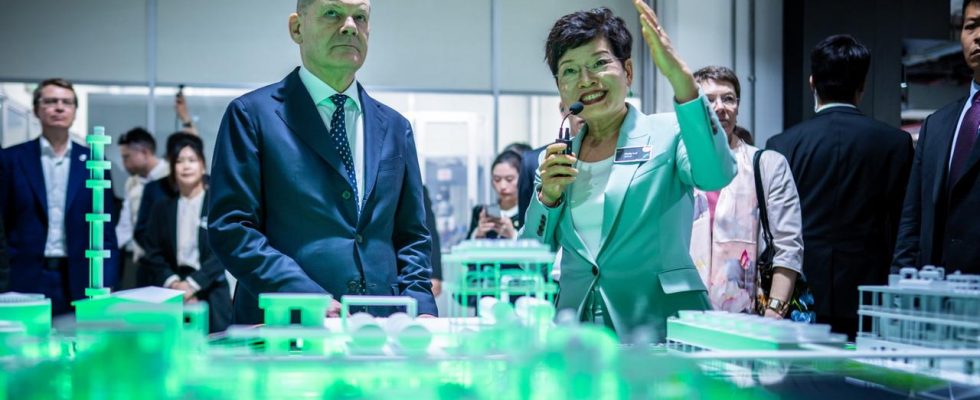On day two of his trip to China, Chancellor Scholz visits Shanghai. There he hears complaints from German companies about a lack of competitive opportunities. These could also be an issue when Scholz meets President Xi.
During his meeting with students at Tongji University in Shanghai, Chancellor Olaf Scholz repeatedly interspersed remarks about freedom – like other German politicians before him, in the hope of touching a nerve. Success uncertain. Tongji University is an elite university with a focus on German, and many future engineers are trained here. And the level of Chinese technology is growing rapidly – which increases the competitive pressure for German products.
This is also the topic at the meeting of the German Chamber of Commerce Abroad (AHK) with the Federal Chancellor. “We really compete with Chinese companies on an equal footing when it comes to high-tech, the automotive industry or renewable energies,” explains Maximilian Butek from AHK Shanghai in an interview with ARD. “We also have to look at where we have to become more competitive and at what level we have to create fair competitive conditions in order to be able to operate in the market at all.”
Punitive tariffs from the EU could also affect German companies
The majority of the approximately 5,000 German companies in China complain about increasingly unfair conditions. For example, about being cut off as a foreigner from the necessary networks with the authorities. Scholz said after his meeting with the Foreign Chamber of Commerce that he would take these problems into his political discussions. He emphasizes how important access to public tenders is. “All questions that are of great importance to us and that we will deal with,” said Scholz.
The question is which means lead to the goal. The EU is currently considering whether to impose anti-dumping duties on Chinese electric cars. The accusation: These could only be 20 percent cheaper than European models because they are manufactured with illegal subsidies. The fear: With electric cars, what has already happened to the solar industry could be repeated – the end of many European companies.
Concern about countermeasures from China
But German car companies are against punitive tariffs because China is their largest market and they fear Chinese countermeasures there. Maximilian Butek from the Shanghai Foreign Chamber of Commerce adds: “The automobile industry consists not only of the manufacturers, but also of the suppliers. And if you ask them, they are actually doing quite well. The market shares that the German automobile manufacturers are losing and giving up to Chinese manufacturers , the suppliers can serve. If you look at the Chinese manufacturers, there is a lot of German technology from German suppliers.”
Scholz sits down competitiveness German companies
Punitive tariffs according to the EU’s idea – that’s not what the Chancellor advocated in Shanghai. Instead, he relies on the strength of German companies: “That’s why the standard with which we approach global competition is that we ourselves want and have to be so competitive that we can withstand this competition everywhere.” But this must be done from a position of self-confident competitiveness and not from protectionist motives, warns Scholz.
Maximilian Butek from the Foreign Chamber of Commerce told ARD he was satisfied with the Chancellor’s commitment to fair and open markets. This is an important signal for German companies in China.
The Chancellor’s delegation has now arrived in Beijing. Olaf Scholz will speak there on Tuesday with state and party leader Xi Jinping and Premier Li Qiang. About five hours are planned for this. Then it should also be about the war in Ukraine and the Iranian attack on Israel.
Astrid Freyeisen, BR. currently ARD Shanghai, tagesschau, April 15, 2024 7:26 p.m

